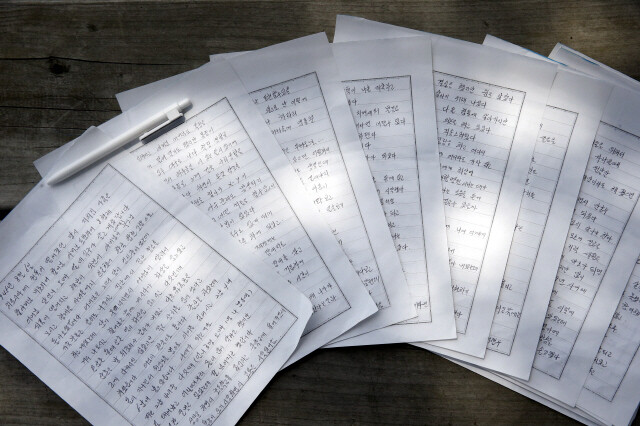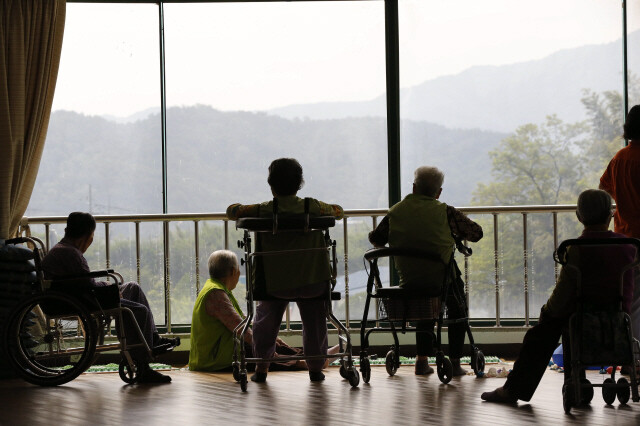hankyoreh
Links to other country sites 다른 나라 사이트 링크
Second generation A-bomb victim’s open letter to Barack Obama

With US President Barack Obama’s trip to Hiroshima, Japan, coming up on May 27, Han Jeong-soon, 57, honorary chair of the Association for the Second Generation of Korean Atomic Bomb Survivors sent the Hankyoreh a letter that she is sending Obama.
Han still suffers from ailments she inherited from her parents, who were exposed to radiation when the atomic bomb was dropped on Hiroshima in Aug. 1945. In the letter, she asked Obama to pay attention to the Korean victims of the atomic bomb and to work to ensure that no one else will have to suffer as she has.
Dear Barack Obama,
I am a 57-year-old woman living in South Korea, named Han Jeong-soon. After learning that you would be visiting Hiroshima, Japan, on May 27, I decided to write you this letter to share with you the sad story of the children of Korean survivors of the atomic bomb who have been victims from the moment they were born into this world.
My parents were exposed to radiation when the atomic bomb was dropped on Hiroshima in Aug. 6, 1945, and I am a member of the second generation of atomic bomb victims who have inherited sickness from my parents. When the atomic bomb went off, there were 13 people living under my family’s roof - my grandfather, grandmother, father, mother, my father’s seven brothers, my older sister and older brother. My mother was pregnant at the time. While my family members fortunately survived the blast, they all suffered burns and other serious injuries.
After Korea’s liberation, my father brought the entire family back to Korea. Shortly after arriving, my mother gave birth to a child, but the child soon died because of an unknown disease. After this, my mother had six more boys and girls. Until his death in 1979, my father suffered from heart disease. My eldest brother died in his early 30s from a brain tumor, and my eldest sister also died suddenly in her early 30s without even knowing the name of the disease.
As the seventh of eight children, I was very frail from a young age, and when I entered middle school, both of my legs started to hurt. The various treatments that I received were no use, and we couldn‘t figure out the cause. After graduating from middle school, I found work in Daegu, but I could not hold down any job for long because of the pain in my legs.
I got married at the age of 24 and had a son the next year. At his birth, my son was diagnosed with cerebral palsy. I thought my world was falling apart. My health was getting worse as I got older, and my son had a congenital defect. My mother-in-law looked at me coldly, and my husband gave me the cold shoulder.

The pain was so bad that I couldn’t breathe, but I gritted my teeth and had a second child. Fortunately, I gave birth to a healthy child.
As time went by, my first child’s arms and legs began to twist and stiffen. As my own legs ached, I carried my child from one hospital to another for treatment, but he never seemed to get better.
Because I was in so much pain that I couldn’t even get up, I also visited the hospital, and was diagnosed with avascular necrosis of the femoral region. The only way to treat my condition, I learned, was to have joint replacement surgery. Since I had no way of affording the surgery, my uncles raised the money for me. About two months after receiving the surgery, I was able to walk again.
But by this point the family finances were already in trouble, and my husband had lost interest in me. My mother-in-law tormented me, too, blaming me for giving birth to a handicapped son and for causing the whole family trouble because of my sickness. In the end, my husband and I divorced.
Not long after that, one of my older sisters also had joint replacement therapy because of avascular necrosis of the femoral head. My other siblings also had heart attacks and had operations on their shoulder joints.
And then in 2002, I happened to watch a television program about how the children of atomic bomb survivors were suffering from ailments related to their parents‘ radiation exposure.
When I learned that these ailing children had created a group called the Association for the Second Generation of Korean Atomic Bomb Survivors and that they were meeting at the Hapcheon Welfare Center for Atomic Bomb Victims in South Gyeongsang Province, I visited the center.
There I met a man who was handing out the materials and kept coughing. He was wearing a long-sleeve jacket and had a scarf around his neck despite the fact that it was summer.
“My name is Kim Hyeong-ryul, and I live in Busan,” the man told me. “My mother is an atomic bomb survivor, and my lung capacity is just 20 or 30 percent of ordinary people’s. Because I come down with pneumonia so often, life is really hard for me.”
That was when I first realized that there were people who had it even tougher than me. I discovered that my suffering was due to the aftereffects of radiation exposure. I decided then that I needed to work with Kim Hyeong-ryul to solve the problem. But even that only lasted for a little while before Kim Hyeong-ryul passed away in 2005 at the young age of 35. Jeong Sook-hee, who had been operated on for the same condition as me, took over from Kim as chairperson of Second Generation Korean A-bomb Survivors, while I became general director.
Three years later, Jeong Sook-hee‘s health had declined too much for her to do outside activities, and I became the group’s third chairperson. While I was working for the group, I continued doing whatever I could to earn a living, including cleaning work at public bathhouses and motels. I became so physically and emotionally exhausted that I had to go back to the hospital, where I was diagnosed with a whole list of conditions: hypertension, depression, neuropathy-related insomnia, hypomyotonia, dizziness, and stomach problems.
While I was in the hospital, I worried a lot about how I was going to survive now that I was broke. It was then that someone reached out warmly to me - a nurse who was caring for the patient in the next bed. I decided that I should help people are suffering and struggling, and so I went about taking courses and earning certification to become a nurse myself. Today, I look after patients, and in doing that my own conditions have healed.
The suffering I‘ve experienced is really quite ordinary compared to what some of the other members of Second Generation Korean A-bomb Survivors have gone through. Kim Hyeong-ryul lost his life to a rare condition known as congenital immunoglobulin deficiency. The next chairperson, Jeong Sook-hee, still cannot walk due to failure to heal after an artificial joint insertion operation. Vice chairperson Jeong Cha-si has not experienced any major symptoms, but her daughter suffers from Down syndrome, as does Jeong’s younger brother and his wife.
Yet we second-generation atomic bomb survivors are not granted even the recognition that our conditions are related to exposure. They claim that there is no medical proof that the conditions I suffer from are aftereffects from radiation. If that’s true, then what it the cause of these rare diseases I have? To whom do I appeal over this unending pain?
Seventy-one years have passed since the atomic blasts - far too long a time for people to continue living life in pain. It is late now, but it is time to take measures for the victims.
And so I wish to make a bold request of you, President Obama. For the 71st anniversary of the atomic bomb explosions, I want you to pledge to work harder so that we can leave a peaceful world to future generations, a world where there are no more victims of atomic bombs, a beautiful world where all people everywhere can smile and enjoy happiness. And I want you to reach out to comfort and soothe the unfairly victimized Korean atomic bomb survivors and their children.
On May 27, I will be traveling to Hiroshima to give a more detailed explanation to you in person. I know that you are busy, but I hope that you will meet with me and listen about the suffering of Korea’s atomic bomb survivors and their children.
In closing, I promise to visit you on May 27.
Han Jeong-soon, Republic of Korea
Introduction by Choi Sang-won, staff reporter
Please direct questions or comments to [english@hani.co.kr]

Editorial・opinion
![[Column] Park Geun-hye déjà vu in Yoon Suk-yeol [Column] Park Geun-hye déjà vu in Yoon Suk-yeol](https://flexible.img.hani.co.kr/flexible/normal/500/300/imgdb/original/2024/0424/651713945113788.jpg) [Column] Park Geun-hye déjà vu in Yoon Suk-yeol
[Column] Park Geun-hye déjà vu in Yoon Suk-yeol![[Editorial] New weight of N. Korea’s nuclear threats makes dialogue all the more urgent [Editorial] New weight of N. Korea’s nuclear threats makes dialogue all the more urgent](https://flexible.img.hani.co.kr/flexible/normal/500/300/imgdb/original/2024/0424/7317139454662664.jpg) [Editorial] New weight of N. Korea’s nuclear threats makes dialogue all the more urgent
[Editorial] New weight of N. Korea’s nuclear threats makes dialogue all the more urgent- [Guest essay] The real reason Korea’s new right wants to dub Rhee a founding father
- [Column] ‘Choson’: Is it time we start referring to N. Korea in its own terms?
- [Editorial] Japan’s rewriting of history with Korea has gone too far
- [Column] The president’s questionable capacity for dialogue
- [Column] Are chaebol firms just pizza pies for families to divvy up as they please?
- [Column] Has Korea, too, crossed the Rubicon on China?
- [Correspondent’s column] In Japan’s alliance with US, echoes of its past alliances with UK
- [Editorial] Does Yoon think the Korean public is wrong?
Most viewed articles
- 1[Column] Park Geun-hye déjà vu in Yoon Suk-yeol
- 2Will NewJeans end up collateral damage in internal feud at K-pop juggernaut Hybe?
- 3The dream K-drama boyfriend stealing hearts and screens in Japan
- 4Thursday to mark start of resignations by senior doctors amid standoff with government
- 5Why Korea shouldn’t welcome Japan’s newly beefed up defense cooperation with US
- 6[Guest essay] The real reason Korea’s new right wants to dub Rhee a founding father
- 7N. Korean hackers breached 10 defense contractors in South for months, police say
- 8[Editorial] New weight of N. Korea’s nuclear threats makes dialogue all the more urgent
- 9Up-and-coming Indonesian group StarBe spills what it learned during K-pop training in Seoul
- 10Terry Anderson, AP reporter who informed world of massacre in Gwangju, dies at 76